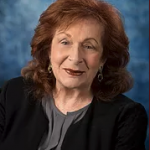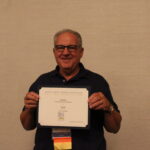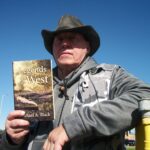FEBRUARY/MARCH 2022
PRESIDENT’S MESSAGE
 The 2022 mid-year board meeting took place Feb. 23/24 at the Orleans Hotel/Casino, Las Vegas. A week prior to the meeting, our vice president, Scott Decker, submitted his resignation, for personal reasons. Board member RJ Beam (Joe Lefevre), our current technology chair, was appointed as the new VP. He will be doing double duty as our tech guru and VP and will be handling the membership chair duties.
The 2022 mid-year board meeting took place Feb. 23/24 at the Orleans Hotel/Casino, Las Vegas. A week prior to the meeting, our vice president, Scott Decker, submitted his resignation, for personal reasons. Board member RJ Beam (Joe Lefevre), our current technology chair, was appointed as the new VP. He will be doing double duty as our tech guru and VP and will be handling the membership chair duties.
We had a full agenda, discussing a myriad list of topics, the planning of our up-coming conference (July 15-17) being the most important. Mike Black is hard at work setting up the keynote speakers, and has three exceptional speakers on board, all members of the PSWA (more info on our website). Don’t forget- the early-bird price is good until May 1, when the price will go up.
As the board concentrates on planning and preparing our July conference, I encourage each of you to sign up and take advantage of the interesting, informative, and educational panels and keynote speakers. It’s also fun, the networking opportunities abound, whether it is with editors, or other talented member writers. After all, the board’s purpose is to provide the best possible conference to you, our members, and from the looks of it, and the hard work of Mike, it is well on its way to being one of the best ever. Mike is doing his usual great job with the planning and selection of the panel topics. If you would like to be on a panel, please let Mike know, and he will do his best to accommodate you. The sooner you contact him, the better your chance to be on one or more panels. You can email him at docatlas108@aol.com.
Over the last year our membership has increased to almost 150, thanks to the efforts of you, the members, spreading the word about the PSWA to friends and fellow writers. My thanks to all who recommended our wonderful organization. Just goes to show the best recruitment tool is word-of-mouth.
I am extremely pleased and privileged to be part of your Board of Directors. All are dedicated to the betterment of the organization and work diligently to provide resources for the membership to become better writers.
I want to briefly touch on a few other items:
- Don’t forget about the Thursday pre-conference writers workshop July 14 (more info at the webpage).
- We are looking for a volunteer to shadow Mike Black and assist in the conference planning, with plans for someone to assume Mike’s duties in the near future.
- Those of you who have an author webpage can submit your URL to RJ Beam (rj@rescuehumor.com) to be included on our website.
- The writing competition submission deadline is Apr. 15. You, too, could become an Award-Winning Author, so get your submissions in soon (See webpage for submission info).
- The board is seeking to appoint one more member to the board as the Member at Large, to assist where needed. If you are interested, please email me – toto@pacbell.net.
I am looking forward to seeing old friends and making new friends at the 2022 conference. I urge you to attend and promise you will not be disappointed. Not only is it informative, but fun, too.
Happy writing,
—John Schembra
PSWA President
MESSAGE FROM THE VICE PRESIDENT
 Because of life circumstances, Scott stepped down as VP of the PSWA. At the board meeting last week, they voted me in to take over that role. Given that much of the VP’s duties revolve around membership, and as the technology guru I was already maintaining our online membership registration system, it logically combines duties. Ironically, this is not my first time as a VP for an organization. In both high school and college, I had terms as VP for student clubs I was active in.
Because of life circumstances, Scott stepped down as VP of the PSWA. At the board meeting last week, they voted me in to take over that role. Given that much of the VP’s duties revolve around membership, and as the technology guru I was already maintaining our online membership registration system, it logically combines duties. Ironically, this is not my first time as a VP for an organization. In both high school and college, I had terms as VP for student clubs I was active in.
Speaking of technology, if you registered for the conference, you might notice that the registration page looks different from in prior years. A new company purchased the software we had been using to sign up for the conference. Not to bore you with the details, but the new company wanted to nickel and dime by billing to use aspects of the program. For example, they wanted to charge us extra for features like the ability to download the list of people signed up so we can print name badges. Right after our July 2021 conference, I started looking for new software that would meet our needs. If this new software works, I will also likely implement it with the membership renewal system.
It is also time to refresh the PSWA web page a bit. Images would help make the page pop. I have an idea for providing some visual interest to the page but need your help. If you could send me photos of your old squad cars, ambulances, fire apparatus, or any department patches. What I plan to do is make some collages of images that highlight the agencies our members have been a part of.
The board also talked about adding some items to the web page like links to resources. Any resources we might add would not be an endorsement by the PSWA. We will publish these links for informational use so authors know what other members have used for software or services in the past.
Lastly, if you have not yet registered for the conference, please consider doing so (https://policewriter.com/events/pswa-summer-2022-conference/). Our Early bird rate of $245 will expire on May 1st. Mike has lined up a diverse group of featured speakers. In addition, the panels he has planned are sure to energize your WIP.
I hope everyone has a happy and healthy spring. Looking forward to seeing you in July.
—RJ Beam
PSWA Vice President
MEMBERSHIP DUES
 After much thought and discussion among the PSWA Board, we have chosen to simplify the way the PSWA handle membership dues.
After much thought and discussion among the PSWA Board, we have chosen to simplify the way the PSWA handle membership dues.
At present the process goes this way: Members join at any point during the year, for one or two or three years. Their membership date and a corresponding expiration date are added to a membership Excel sheet. Periodically, the PSWA Vice President scans the sheet for upcoming renewals that will be due. An email is sent out to each member as their due date approaches or has shortly passed. A second is sent out, and then a third. Each notice is individualized with the date of the notice, either first, second or third, is added to the Excel spreadsheet beside the member’s name.
This process is extremely time-consuming and laborious. The many number of steps provide multiple opportunities for error. I have looked at the way other non-profit, volunteer originations manage their membership dues. All, with the exception of PSWA, use the calendar year as the annual renewal date. None that I am aware of have individualized renewals at dates customized throughout the year with multiple renewal notices being sent.
So, as of January 2022, we switched to the calendar year as the renewal date for all memberships. This year, as we change over, we will extend for those members who joined or renewed from September through December 2021. Hopefully, this is amenable to all members. From my work in other organizations, I realize it is nigh impossible to please everyone and to anticipate every contingency, but we are such a good group and have such a high level of camaraderie, I know you will help me ease through this transition.
Please watch your email messages for my upcoming renewal notices, if you haven’t renewed already, as many have! Thank you much in advance,
—Scott Decker
JUST A QUICK TIP THIS MONTH FOR DEALING WITH PAYPAL.
Sometimes PayPal will try to outthink you. It will either run a transaction before you’re ready or skip past it altogether. This is especially common if you have multiple PayPal accounts. You have a personal account and you manage another for a club or association. You go to do a transaction and PayPal runs amok and makes payment from the wrong account. (Ask me how I know.)
The solution is to always log out of PayPal when you’re done. Then, when a web site kicks you over to PayPal for payment you’ll be forced to log in from scratch. You can be sure you’re logging into the correct account and know that payment will come from that account.
Logging out when you’re done working on any financial site it always a good idea. Don’t just close your browser. Find the logout link (sometimes they hide them) and do a hard logout. IT security isn’t only about firewalls or anti-virus software. There are many small things you can do that move the needle in your favor. A hard logout is just one of them.
See you all at the conference!
—Bob Calkins
PSWA Treasurer
IT LOOKS LIKE THE PANDEMIC IS STILL WITH US.
 My wife Lynn, and I recently caught colds, or at least we thought we did. What we were cursed with were cases of Omicron. We tested positive with home testing kits on a Sunday. Monday, we went to a professional testing kiosk for further testing, hoping that the home testing was a false positive. It wasn’t. Monday night my family doctor called and told me to present myself to our local emergency room, my white blood count was extremely high and he was concerned I might have pneumonia and might need to be admitted to the hospital for treatment. Fortunately, I did not need to be admitted. However, I was hydrated intravenously and had enough blood tests to make Dracula think he was being served a feast laced with antibiotics.
My wife Lynn, and I recently caught colds, or at least we thought we did. What we were cursed with were cases of Omicron. We tested positive with home testing kits on a Sunday. Monday, we went to a professional testing kiosk for further testing, hoping that the home testing was a false positive. It wasn’t. Monday night my family doctor called and told me to present myself to our local emergency room, my white blood count was extremely high and he was concerned I might have pneumonia and might need to be admitted to the hospital for treatment. Fortunately, I did not need to be admitted. However, I was hydrated intravenously and had enough blood tests to make Dracula think he was being served a feast laced with antibiotics.
The last seven states mandating masks in public are giving up their mandates or reducing them significantly. No one knows if we will ever be out from under this pandemic. If you’ve been yearning for the good old days of no masks, I suggest you proceed with caution regarding masks in public places. I know Lynn and I will have our masks handy.
—Keith Bettinger
WRITING CONTESTS AND PUBLICATION.
 Barbara Hodges, the writing competition coordinator did us all a favor by opening up a new phase of competition – FLASH NONFICTION – five hundred words or less about a true event. Although for our competition stories must be public safety minded, other short stories are very salable to different trade magazine.
Barbara Hodges, the writing competition coordinator did us all a favor by opening up a new phase of competition – FLASH NONFICTION – five hundred words or less about a true event. Although for our competition stories must be public safety minded, other short stories are very salable to different trade magazine.
Last year I sent an article to ANGELS ON EARTH magazine. It was about my grandmother’s “visitor” before she passed away. For that little article I receive I received a check for $300. This year I submitted a nonfiction flash article to GOOD OLD DAYS magazine. It’s a family article that will appear in the June edition. A check for $25.00 came with the release form.
These articles may not pay the monthly mortgage, but they pay for writing supplies. These magazines are looking for writers, and we’re writers looking to get paid. Take a moment and ask for the publication’s submission guidelines. Submit articles appropriate to their publication calendar. Open up your file of articles you’ve been looking to eventually submit but didn’t know where. The time to do so is now.
Thank you, Barbara Hodges, opening the door to a new contest format. I had a lot of fun with this new contest.
A special thank you to Mike Orenduff, of Aakenbaaken & Kent – Publishers. He took time to read my self-published book, END OF WATCH, liked it, and published it through Aakenbaaken & Kent Publishers.
–Keith Bettinger
PSWA Secretary
SUPER SEVENTEEN PSWA CONFERENCE IS COMING UP
 We just finished our PSWA mid-year board meeting in Las Vegas this past week and the plans for our Super Seventeen PSWA conference are well underway. Once again, the conference is scheduled for July 14-17, 2022, at the Orleans Hotel and Casino in Las Vegas, Nevada. The Pre-Conference Workshop is set to begin at 9 am on Thursday morning with instructors Marilyn Meredith, Kelli Peacock, and me doing presentations on Writing Effective Dialogue, Self-Editing, and the Muddle of the Middle. Once again, attendees of the workshop get a critique of their manuscript up to 30-some pages by one of the published author instructors. Last year we had a great turnout for the workshop, which runs from 9 am to 3 pm in the Conference Center at the Orleans. The fee is in addition to the conference registration, but it’s well worth it. Everyone who’s attended it has given it rave reviews, so please sign up if you’re interested in improving your writing.
We just finished our PSWA mid-year board meeting in Las Vegas this past week and the plans for our Super Seventeen PSWA conference are well underway. Once again, the conference is scheduled for July 14-17, 2022, at the Orleans Hotel and Casino in Las Vegas, Nevada. The Pre-Conference Workshop is set to begin at 9 am on Thursday morning with instructors Marilyn Meredith, Kelli Peacock, and me doing presentations on Writing Effective Dialogue, Self-Editing, and the Muddle of the Middle. Once again, attendees of the workshop get a critique of their manuscript up to 30-some pages by one of the published author instructors. Last year we had a great turnout for the workshop, which runs from 9 am to 3 pm in the Conference Center at the Orleans. The fee is in addition to the conference registration, but it’s well worth it. Everyone who’s attended it has given it rave reviews, so please sign up if you’re interested in improving your writing.
Plans for the conference itself are shaping up nicely. The check-in procedure begins in the conference center at 3 pm and continues until the start of the Thursday night get together at 545 pm. The get together is an informal and cozy little gathering with delicious snacks and a cash bar, if you’re inclined to imbibe. It’s a nice way to meet new people or reconnect with old friends.
The conference itself gets rolling at 9 am the next morning on Friday and, as I mentioned, is shaping up to be one of the best ones yet. We’ve lined up some fabulous solo presenters. Well known author and publisher (Intrigue Press), Austin Camacho is going to be talking about improving your writing in his presentation, Write Better: Draft, Rewrite, and Edit. Considering Austin’s experience and superb writing skills (I’m a fan), this one should be very enlightening. Fellow publisher, Jo A. Wilkins (Mystic Publishers) will be giving her advice in Writing in Viewpoint: How POV Defines Your Work. Jo is well known in the Southern Nevada area not only for her publishing of great books, but also her many instructional seminars which have helped so many writers improve their craft. So, this is your chance to get the inside scoop from two editors and publishers on what it is they look for in a manuscript. On the factual side, insurance investigator, Rick Wycliffe, will be talking about The World of Insurance Crimes: Invisible and Dangerous. Rick, who has worked in the field for decades, will provide a unique perspective about those crimes that most of us didn’t know existed. Also in the public safety arena, our own Robert Calkins has a fantastic presentation prepared titled, Contraband and Crooks: Working Dogs in the World of Police, Fire, and SAR. A few days before the board meeting, I called Bob and he told me he couldn’t talk because he was leaving for a search. The incident turned out to be a double homicide. He has a bunch of interesting stories to relate and let’s face it, who doesn’t love a good dog story? And as always, we’re assembling an array of interesting panels featuring not only writing, but also a variety of public safety topics. (Make sure to indicate on the registration form if you’d like to be on a panel.)
And last, but not least, there is a strong possibility that our annual 1940’s style radio play will be returning this year. It’s going to depend on attendance of course, so please sign up today, if you haven’t already. That early bird discount price is still in effect, but time is running out. And don’t’ forget to get the special conference hotel room rate at the Orleans. That expires in early June. Details for both the early bird conference registration pricing and the discounted hotel room conference rate are posted on the PSWA Website.
So, take it from me, Super Seventeen is going to be one of the best ones yet. See you in Vegas.
—Michael A. Black
PSWA Program Chair
FROM THE WRITING COMPETITION CHAIR
 Hello everyone. I just returned from Vegas and the board meeting. It was a great one. I’m proud to be a part of the PSWA board. We are all working hard to make PSWA an even better association. There was such energy at the meeting, ideas to take us into the future. Judging by the conversations, the panels for this year’s conference and the material for our writer’s workshop will be outstanding.
Hello everyone. I just returned from Vegas and the board meeting. It was a great one. I’m proud to be a part of the PSWA board. We are all working hard to make PSWA an even better association. There was such energy at the meeting, ideas to take us into the future. Judging by the conversations, the panels for this year’s conference and the material for our writer’s workshop will be outstanding.
Things are going well in the PSWA writing competition. Entries are arriving every day. Before you send yours, please take a moment to read the requirements and guidelines. They have changed since last year.
We are trying to keep the entry fee the same, but postage rates are increasing. That’s why we are asking you to send your entries, unless it is a published book, via email as an attachment. You will still send your entry forms and the entry fee to me.
I’m lining up the judges. Again, the judges for the published books will be authors outside of PSWA. There will be four of them, the same as last year.
The judging for the other entries will be blind, and the judges will not know the authors’ names. Like last year they will find out who the winners are at the awards banquet.
I’m also excited about having a new category, flash writing. Five hundred words or less, not counting the title, and that’s fiction and non-fiction. Quite a challenge, right?
I want to encourage you to send in your entries that are cross-genre. I’m talking romance, science fiction, even children’s writing, as long as there is a public safety element in it. If you have a mage battling dark magic, that’s public safety. If you have a starfighter fighting oppression, that’s public safety. I’m sure some of you have some great ideas for short stories in your heads.
Get the entries to me by April 15th. Please send them to my email…barbaramaehodges@gmail.com, and send the entry forms and entry fee, one for each entry, to Barbara Hodges, 187 Alyssum Circle, Nipomo, CA. Make sure the checks are made out to PSWA.
I am looking forward to seeing you in July. It will be here before you know it. Until then, have a great day.
—Barbara M Hodges
PSWA Writing Competition Chairperson
FROM THE NEWSLETTER CHAIR
 Thank you to all who submitted your articles and member news. Our mid-year board meeting this past week was awesome. The conference is shaping to be one of the best. Mike Black always does an incredible job, a big thank you to Mike.
Thank you to all who submitted your articles and member news. Our mid-year board meeting this past week was awesome. The conference is shaping to be one of the best. Mike Black always does an incredible job, a big thank you to Mike.
I am very excited to announce that we are offering advertisement spaces for the Super Seventeen PSWA Conference Programs. There are limited spots available, so you will want to have your fully designed ad to me (peacock.kelli3@gmail.com) no later than May 20th. The prices and dimensions will be listed on the website. If you need help with your design Barbara Hodges (barbaramaehodges@gmail.com) will be available to assist for an additional charge. Advertising will be available to any current PSWA member.
–Kelli Peacock
PSWA Newsletter Chair
AUDIOBOOKS…PRODUCTION AND MARKETING

The audiobook market is one of the fastest-growing segments of the publishing industry. According to the Audio Publishers Association, it grew an estimated 24.5% from 2017 to 2018.This included self-published authors and small publishers who access numerous marketing actions and opportunities to create and an awareness and enhance sales. And think of the millions of people who drive to and from work each day many listen to audio- books. They are just one audience since people can listen anywhere, anytime. Following are the three major elements involved in producing and marketing an audiobook.
Production:
Recording:
The recording of your book is the first step in the process. Either the author or a talent will need to be well spoken, easy to understand and appealing to listen to.
Once the talent has been selected the recording sessions can begin and recording time will depend on length of book. Usually estimated by word count, for example a 60,000-to-70,000-word count book should take about ten hours.
Post-Production/File Creation:

Once the recording is complete, the file should be carefully reviewed to make sure all flubs, misreads, etc. are cleaned up. Music pauses and other needed elements should be inserted in the proper places for an entertaining final product.
Once the product is completed, files are created in the proper formats for the authors website, Audible, Hoopla and other audio book sellers. The files are delivered and uploaded as needed for each site. Tests should be made to make sure the files are being downloaded correctly and meet both yours and the seller’s requirements.
Distribution:
Audiobooks can be distributed and sold on Amazon, Audible, Apple, Google, Chirp, Hoopla etc. Your publisher should be able to help you list it on Amazon. There are companies like Findawayvoices.com that can help with development and distribution and librofm.com an independent Audio book retailer. Be sure to compare pricing. If you’re published through kindle, they should be able to help you list your audiobook on Amazon.
Marketing:
With the recording done and the files uploaded it’s time to market the book to drive sales. This includes creating strong, appealing messaging concepts with opportunities for on-going visibility for your audio book.
First and foremost, audio-specific marketing materials, graphics, and posts for audiobooks need to be created. A simple and quick example would be to have a book rendering with headphones bracketing the cover. This is an easy way to catch the attention of audiobook listeners, letting them know that this book is available in audio format and is being marketed directly to them.
Following are some additional strategies for promoting an audiobook for preorder and sales:
Launch – Develop and distribute a press release announcement. Send to your contacts, post on your social media and also on your personal website.
Your website – The file will be uploaded to your website where people can download samples and also purchase your book. Adding an ecommerce element to your site is simple and can be set up to handle any credit card transactions with the funds from the sales being delivered directly to a bank account of your choice. You have the price set and run various promotions, including contests to generate sales. In addition, this will be a good way to sell printed copies of all your titles. Or, of course you can work with a distribution company such as Findawayvoices.com.
Social Media – An audiobook should be promoted across all social media channels. Samples should be available for download with direct links to your or other sites for purchase. Considering running contests for free copies of the audio book.
Newsletter – Announce the preorder via your newsletter or blog if you have one and on your social media pages. Many of these groups are genre-specific (like Aural Fixation and Audio Loves on Facebook for the romance genre). Authors can do a search for groups or pages that focus on audiobooks in your genre.
Bloggers – Approach audio-centric bloggers (e.g., AudioGals), genre-specific bloggers, and review podcasts. Offer an Advance Listener Copy (ALC) or ask about partnering on a giveaway for an ALC to one of their subscribers/listeners.
Podcasts – Review podcasts also tend to have promotional spots/opportunities for advertisers, where authors pay a fee to share a sneak peek of their audiobook on the podcast. Data suggests podcast listeners are also audiobook listeners. There are a number of podcasters listed on google who feature interviews with authors.
Facebook Live – Leading up to the release or even after the audiobook is out, ask your narrators if they’d be willing to do a Facebook Live video with you. Prepare questions ahead of time for your narrator and share short snippets of the book live. Make sure you post the link to your audiobook in all social media and special event posts. You can also do Facebook posts and boosts to vast and specific audiences.
Boost retailer pages – Post screenshots of your audiobook available on retailers and tag that retailer in your post/social media announcement. Some retailers might even share your post to their audience, especially if you consistently share their purchase links (even library distributors, like Hoopla and OverDrive!).
Affiliate links – Always remember to use affiliate links on your website, directing all traffic (social media, podcasts, bloggers, newsletter, etc.) through your affiliate links.
Discount the audiobook and promote it on Chirp(Owned by Bookbub) – This is another marketing option to consider. The ability to control the price of an audiobook on retailers is an extremely valuable marketing tool. If you distribute wide through Findaway Voices (to Chirp, Apple Books, Google Play, Authors Direct, Audiobooks.com, Hoopla for libraries, etc.) then you can have full control over the price of your audiobooks on those retailers.
Ultimately, you’ll have the ability to offer discounts and sales on your terms and your schedule rather than having the price (or discount) dictated to you.
As we said, audiobooks are a huge market and an opportunity to significantly increase awareness of your books and you as an author, while potentially increasing your income. Costs vary. Comparison shop or ask for a referral.
Marcia Rosen, MarciagRosen@gmail.com, www.creativebookconceptscom
Jory Rosen, jorla@gmail.com, www.jrosengroup.com (Marcia’s son)
—Marcia Rosen and Jory Rosen
THE JOY OF WRITING
 I like to attend craft fairs as a vendor, signing and selling books, and talking with the people who stop at my booth. The question I get the most is some version of why I wanted to be a writer.
I like to attend craft fairs as a vendor, signing and selling books, and talking with the people who stop at my booth. The question I get the most is some version of why I wanted to be a writer.
Well, I have to go back to when I was a young boy and was introduced to Edgar Rice Burroughs’ Tarzan books by my uncle, who had started collecting them when he was a boy, 10 or 12 years old. He eventually owned the entire series—all 24 of them. I was around 8 years old when my family took the train from California to New York for a visit. We were there two weeks, and I managed to read the first 3 of the books. I was hooked! I started collecting them myself, and over the next 20 year or so, have all the Tarzan books in my collection, along with 27 other Burroughs books.
I loved to read, but never had I read anything like the Tarzan books. It amazed me that Burroughs was so adept at creating a whole new world— plants, creatures, and civilizations— so vividly. It was then that I wanted to be a writer that could do that and bring the sort of joy I felt to others who read my books.
I am proud to say that I have written 8 books and have people that come back each year to the crafts fairs I attend specifically to see if I have a new book out.
I get more pleasure from that, and from emails or reviews telling me how much they enjoyed reading my book(s). That pays more dividends to me that the royalties from the sales. I often gift books to special people in my life—special friends, family, and sometimes strangers. I am particularly pleased when they tell me they couldn’t put it down or gave it to a friend/family member to read. Many of them end up buying more of my books, which to me is what determines the success of my writing, not the number of sales.
To those who have read my books, I hope I have brought the same joy into your lives that Tarzan did to mine!
John Schembra spent a year with the 557th MP Company in Vietnam in 1970. His time as a combat M.P. provided the basis of his first book, M.P., A Novel of Vietnam. After returning from Vietnam, he became a police officer with the Pleasant Hill Police Department, retiring as a Sergeant after nearly 30 years of service.
John has six other published novels in the mystery/thriller genre, one mystery, Sin Eater, has supernatural undertones. His latest book, The List won the 1st place award in the Public Safety Writers Association 2021 writing competition. John has earned nine writing competition awards. You can find out more about him and his books, and read their first chapters, plus a couple of short stories at his website; www.jschembra.com. John can be reached at his email; toto@pacbell.net.
John is currently hard at work writing his eight book, Southern Justness, number six in the Vince Torelli series.
— John Schembra
QUICK EDITING TIPS

You all probably know these, but it never hurts to be reminded.
Get rid of words that you use too often.
- That—most of the time the word is unnecessary.
- Just—this is one of my favorites and I always check to see how many times I’ve used it.
- So—also unnecessary.
- Yes—in dialogue. Leave it off and see how the sentence sounds.
- Then–almost always unnecessary.
Instead of using the usual dialogue tags, substitute an action or a description of the person who is speaking. For example:
“Are you sure you want to go there? Won’t it be dangerous?” Worry lines appeared on Marisa’s usually smooth forehead.
Tim pulled aside his leather jacket and exposed his gun tucked into its holster. “I have my protection.”
Carrie shook her mass of auburn curls. “I’m going to go with him. No one would ever expect me to be armed.”
Said and asked are preferred over tags like: blurted, hollered, gasped, whispered. You can get those descriptions across other ways, such as:
Billy interrupted the discussion. “You’re being foolish.”
Carl raised his voice. You’re going to get yourself killed.”
Laura leaned closer to whisper. “Don’t tell anyone else what you’ve planned.”
You get the idea.
Once we had a wonderful writer come to the PSWA conference, and her big advice was to get rid of the word was if possible. For instance:
Bill was running toward the house. Instead, use Bill dashed toward the house, or the best descriptive verb.
It is easy to change any of the was — Ing words to words ending in ed. Even better, always find the best descriptive word for the action. Looked is another word that has lots of better descriptive synonyms of what the character is doing. (Spied, stared, studied, viewed, etc.)
There are other ways to get rid of the word was. Try changing the sentence around. This is from the manuscript I’m working on now
It was beginning to appear that there was definitely a possibility he might be a suspect.
It appeared a definite possibility he might be a suspect. (If I worked on it more, I could probably make it better.)
To help your reader, use a new paragraph each time a new person speaks or does something. Try not to give your characters names that rhyme, sound alike, or all start with the same letter.
These are simple reminders, hope they help.
—Marilyn Meredith, author of the Deputy Tempe Crabtree series and the Rocky Bluff P.D. mysteries.
THE SHORT STORY FOUR-MINUTE MILE

In a Word file on my computer is a Sherlock Holmes pastiche story, the second one I’ve written. What I hadn’t realized is that my two stories follow a very well-trodden path laid by Arthur Conan Doyle and followed by Holmes acolytes ever since.
In a Sisters in Crime webinar last week with short story dream team Art Taylor and Barb Goffman, Art presented the classic seven-part structure of a Sherlock Holmes story (which he credited to the apparently out-of-print book, Sherlock Holmes for Dummies). Through some process of osmosis, it seems I’d absorbed and followed at least the first few of those parts: Part 1 – cozy domestic scene; Part 2 – Sherlock shows off; Part 3 – the problem is presented. In my first Holmes story, the problem arrived by letter; in the new one, via a distraught Mrs. Hudson. Structural awareness greatly simplifies the writing job and prevents wandering about in rhetorical left field. I know what needs to get done.
In a short story, emphasized Barb, the writer has to focus. As she puts it, “A short story is about one thing,” even if that thing is unclear at the start. If you’d asked me what my story “Burning Bright” in Busted! Arresting Stories from the Beat was about, I would have said, “Two Wisconsin ne’er-do-wells plan to rake in a lot of money by having a tiger fight a bear.” I would have added, “and it’s also about an outraged deputy sheriff trying to stop them while trying to persuade her dad to move into assisted living.”
So, would Barb say “Hey, that’s two things”? Only after I wrote “The End” did I realize the story was only superficially about those two things. What it was really about was respect for autonomy.
Art cited six steps in a typical short story, and they usually, though not necessarily, appear in order: 1- Introduce the character, 2- express their desires, 3- action (what the character does about those desires), 4- factors that impedes obtaining the desires (3 and 4 can repeat several times), 5- the climax, 6- resolution. In the classic analysis of Cinderella (below), action and impediments trade places many times (nothing to wear? fairy godmother).
Art pointed out that the six steps are useful as a tool for planning a story, and for diagnosing why it isn’t working. Barb pulls several of the steps together and recommends starting a story is by asking, “what’s the conflict?”
Lest you think these are recommendations to write to a formula, they are not. The variety and rearrangement of parts is practically infinite. Perhaps it was on this listserv where a contributor reminded us about this anecdote: When someone said to crime writer Donald Westlake that writing genre fiction was easy: All you have to do is follow the formula. He responded, “I’ll give you a formula for running a four minute-mile. Run each quarter-mile in less than a minute.”
(Art’s talk and his slides will be in the members section of the Sisters in Crime website.)
–Vicki Weisfeld
You Never Really Lose the Blue

A friend of mine asked me the other day if I missed the adventures of police work. Yeah, I told her. I miss police work every day. Then I added, you never really lose the blue…
And you don’t. I liken it to being like those old, retired fire-horses from a bygone era that my friend and our fellow PSWA member, Robert Haig Sr., wrote about in his book, Fire Horses. Up by Detroit, Michigan the horses were taken to a nearby island and set free to roam after their active-duty time pulling the fire engines had passed. One lookers would recall how their ears would prick up at the sound of a distant siren. I’m sure most, if not all retired police and firefighters can relate to hearing that sound. It’s a modern-day siren’s song.
Like I said, you never really lose the blue, or the red either, for that matter.
A number of years have passed since that day I retired, or pulling the pin, we called it. Everyone I’ve talked to who’s gone through it has agreed that it’s a bittersweet experience. I once told my aunt, who’d asked me why I became a cop, that once police work gets into your blood, you never want to do anything else. I’ve heard tell that the current crop of police officers today don’t harbor this same passion for the job, but I doubt that. Some may claim that it’s just a job, but I’ll never believe that. It would be sad if it were true.
As a nation we’ve recently seen an unprecedented wave, however, of officers, young and old, leaving the profession and this doesn’t surprise me. In this past year I’ve noted the way cops have been treated and maligned by the media. We’re also at a 30 year high for line of duty deaths. In a lot of ways, I’m glad I’m not in the game anymore. This vicious and mendacious litany against cops angers me. I still remember, with great bitterness, being verbally attacked by some members of a writer’s organization that I used to belong to during the riot-laden summer of 2020. It was precipitated because this organization jumped on the liberal bandwagon and posted some effusive praise for a radical organization that was advocating the murder of police officers. I “dared” to point out that the police deserved our support in wake of the ongoing riots and what they were going through. Several members of the organization immediately launched verbal tirades against me, saying “the police were the problem,” and tried to lecture me about police work. I immediately responded with “Good-bye, and good luck,” and resigned my membership. A couple of members contacted me privately to say the way I was treated had been “disgraceful.” One described the attack against me as “an unhinged response.” Some others said they were also leaving the organization. I appreciated their words of support, but I didn’t encourage them to resign. Instead, I told them that if they felt their membership could benefit them as writers, that they should stay. Whether they did or not, I don’t know. I left and never looked back. My hope is that this “defund the police” movement falls by the wayside now that it’s been exposed as contributing to escalating and horrendous crime rate. If recent trends are any indication, the fallacy of getting rid of cops and hoping that crime will disappear is becoming more and more apparent in spite of a biased media in many cases that no longer investigates or reports the truth.
Politics has always been an enemy of good police work. That’s another part of police work that I don’t miss. For the most part, politicians are only out to benefit themselves. Police work, on the other hand, is a quest to uncover the truth, safeguard the innocent, protect the Constitution, and maintain order. As I write this, I am reading a current police procedural novel by a popular writer. Unfortunately, he isn’t getting it right. And this is not a matter of politics. I couldn’t care less who he voted for or what his politics are, but I do care about him portraying cops in an accurate way. Like I said, he isn’t getting it right. That’s hard unless you’ve walked the walk or talked to someone who has. This will probably be the last book of his that I read.
Listen… I just heard a distant siren. Take a few moments and remember the last time you heard one.
Did you hear that siren’s song? Did it make your heart start to beat faster?
Mine is.(Sigh)
What I miss the most about not being a cop anymore is not the adventures, although they were often times very exciting. Going toe-to-toe with an offender, going after an armed robbery suspect, or feeling the piercing zip of a bullet that misses as it whizzes by your head is both simultaneously exhilarating and terrifying. There’s nothing quite like the adrenaline rush of racing to a call, facing danger, or making that big arrest. But that’s not all of it … Not by a long shot. And that’s not what I miss most.
Being out there and making a difference in people’s lives took precedence for me. Making a good arrest was very fulfilling, but that was not the best part of it. I got into police work because I wanted to help people, and always stressed that was our primary duty to the personnel in my squad. Being there for someone in a moment of crisis, whether it was protecting the weak and oppressed, or merely comforting someone in a single crisis in that moment of their life provided the greatest satisfaction for me.
I remember one midnight shift rolling up to the report of a family disturbance and seeing a full-grown man beating his young son with a belt in the middle of the street. I stopped him and placed him into custody and then called an ambulance for the kid. Another time I broke down a door to arrest a guy who was beating his wife. Yeah, as it turned out, I ended up decking him, but I had little choice.
Things didn’t always involve violence. I remember backing one of my guys up on an accident scene where a car load of Mexicans, who were most probably illegals, had gotten into a car accident with another vehicle. The driver was the only one who spoke English, and he was vehement that none of them wanted or needed medical treatment. They guy looked kind of shady, and I saw this one woman in obvious distress. I asked her in Spanish if she was all right and if she wanted to go to the hospital. She said she did and I immediately called for an ambulance. The driver’s jaw just about hit the pavement when he heard me. Now my point is that in that brief moment I was there for that woman. Imagine being in a foreign country, being scared, being hurt, and not being able to communicate. Just showing support for someone in something as mundane as a traffic crash is important. I used to say at my roll calls that no call was unimportant. If you were there for that person, even just by standing by and reassuring them in a time of need or crisis, even if it was relatively minor, was what we were supposed to do.
Another time I remember rescuing this little girl’s cat from a tree. It actually turned out to be a rather dangerous call for me and the animal. The cat had been treed the day before and was in this V-shaped section fairly high up. The little girl and her mother were there and one of the neighbors got this extending ladder and set it against the trunk. This spooked the animal and the cat to climbed even higher to the next V-shape section. It looked to be up about fifty feet or so. I climbed up to get to the animal. I moved slowly and with deliberation, all the while trying not to lock eyes on the feline lest it go further up the tree. Luckily was very accustomed to cats, having had several of my own. After reaching the pinnacle where the kitty was, I cautiously reached out and petted the feline. It seemed to react well enough, so I grabbed its scruff and held it to my chest. The cat’s claws practically fastened into my vest. After I climbed down, also with slow deliberation, I gave the cat to the little girl and her mother, but first admonished the errant feline that it had eight lives left and to use them wisely. (I stole that line from an old Bruce Lee flick, but I figured in this case I’d earned it.
Yeah, I miss the camaraderie and the brotherhood, too. It’s something that people like those idiots in the media or that bestselling author I mentioned don’t understand. When your back’s against the wall, that person standing next to you is your brother… Or your sister. I remember being in charge of the honor guard at a young officer’s funeral after his line of duty death. I had to give the folded flag to his widow as she sat there holding their baby daughter. The child was barely a few months old. I searched for the right words to say and told her that he would never be forgotten. I spoke the truth because even now, years later, I still tear up when I think about that moment. We weren’t related, but he was my brother. We both wore the same uniform, and he was buried in his.
Like I said, you never lose the blue.
—Michael A. Black
LANGUAGE
 With the recent controversy involving Joe Rogan and Spotify over his use of certain language, it brought to mind an article I had written for our local FOP newspaper, Simulcast. I wrote this article in 1995. It was basically triggered by the O.J Simpson case. The editor of the paper thought the article significant enough to put it on the front page. Here is the article. It was titled The N-Word.
With the recent controversy involving Joe Rogan and Spotify over his use of certain language, it brought to mind an article I had written for our local FOP newspaper, Simulcast. I wrote this article in 1995. It was basically triggered by the O.J Simpson case. The editor of the paper thought the article significant enough to put it on the front page. Here is the article. It was titled The N-Word.
The Simpson trial has revealed many facets of the criminal justice system. None of these revelations has had more of an impact on law enforcement as the use of the N-word by Detective Mark Fuhrman. Not only had Fuhrman been shown to be a liar, but if the taped conversations he had with a screen writer were actually true, then Fuhrman had disgraced his department. However, Fuhrman was not on trial, Simpson was. Fuhrman cast a shadow of a doubt over the trial and whether Simpson was guilty or innocent no longer mattered. The defense had successfully entered race as an issue and Fuhrman substantiated it.
The work of every cop in that case would be for naught. The millions of dollars spent on a fair trial would be wasted. Now because Simpson was a Black man he would be acquitted. Whether he savagely killed two people will be clouded by the fact that one of the hundreds of police officers, both black and white, who worked on the Simpson case is perceived as a racist.
I unfortunately hear the N-word almost every day in the District of Columbia. I hear it in conversations between one or more Black officers. Does that make the use of the N-word okay? Not at all. These officers are not only disrespecting themselves, but they are disrespecting all the people of their own race. The N-word is recognized as a derogatory term referring to Black people and whether white people or Black people use the word it is still derogatory. As a white male who is almost fifty years old (I’m 76 now), I’m not going to tell you I’ve never used the N-word. I have in fits of anger. I am not proud of the fact. I am ashamed that I could have been that ignorant. I don’t use the N-word any longer because I hope I have matured enough to know the effect it has when used against someone.
The N-word is not the only word used to degrade a race and we have heard them said at various times. What we need to recognize is that these words are words of hate. These words don’t bring people together, they separate people, not only by color, but by a person’s natural heritage or religious affiliation or sexual orientation. We above all people should have no barriers between each other or between us and the community we protect. We above all people should recognize how it is to be treated differently just because we’re cops. We represent the Law of the Land and the Law of the Land says that all people are created equally. We all have prejudices, but we can’t let those prejudices interfere with our jobs. Racism is the tool of the hate mongers and anytime they win, the entire human race loses.
That was the end of the article, but I’d like to pose a question. What about us writers? What language are we prohibited from using? How do we censor ourselves in our writing? I’ve heard I don’t write about explicit sex. I try to stay away from cursing or using derogatory words about a person’s religion or sexual orientation. I don’t kill animals or have a scene where a child is molested. Now, I’ve heard writers explain, I am writing to a certain audience and my readers don’t like to read about such things. That’s understandable. After all you’re writing to sell your books and if by putting any of the above would turn off your readers, why would you.
Recently, I have been reading the Bible. I made up my mind to read the Bible in its entirety. In Old Testament God kill thousands, men, women, and children. He kills livestock and leaves land barren. Kings of other nations are murdered and impaled at the gates of their cities. Male and female prostitutes appear frequently in the books of the Old Testament. Homosexuality is condemned and slavery is a way of life. I don’t say this to denigrate the stories in the Bible. I only mean to point out the book most read, most sold in the world contains the things we writers have a tendency to censure.
A writer has every right to write what they think would be acceptable to their readers or to follow whatever limitations on language they put on themselves but understand this is censorship.
—Joseph B. Haggerty Sr.
In May of 2015, commenting in the New York Post on the line of duty murder of twenty-five-year-old NYPD Officer Brian Moore, I wrote the following: (parts redacted)
 So today, once again, we see a grieving family — a police family. Moore’s dad, uncle and cousin all served the NYPD. His police brothers and sisters are numb with grief.
So today, once again, we see a grieving family — a police family. Moore’s dad, uncle and cousin all served the NYPD. His police brothers and sisters are numb with grief.
The ceremony will be the “Full Inspector’s Funeral.”
Police motorcycles will rumble to the church. Helicopters will roar low overhead. Bagpipes will wail. Thousands of officers from across the country will salute as Moore’s casket is carried into the church.
The politicians will drone on about root causes and gun control.
The cops will fight back tears and stand at attention until the hearse is out of view.
Then they will return to their commands and do what cops do — hoping that by taking that one gun off the street, or that one bad guy, it might mean that one less innocent victim dies.
The cops will be doing a job that gets more difficult each day.
And they’ll be praying that they do not have to put on the dress-blue uniform for another cop’s funeral ever again.
I had no way of knowing back then, that in the coming six years-eight months-my former colleagues would be donning those dress blue uniforms a heart breaking one hundred-sixty times to attend funerals for their NYPD sisters and brothers who had fallen in the line of duty.
The majority of these deaths were from 9/11 related illnesses. And, that number grows larger by the day. The Covid epidemic has struck down eight of the Finest to date, and unfortunately, that number will probably grow also.
Gunfire has been involved in the deaths of five officers since Brian Moore’s killing. The names, not recognized by most New Yorkers, but embedded in the minds of active and retired NYPD members: Brian Mulkeen, Brian Simonsen, Steven McDonald, Paul Tuozzolo and Officer Miosotis Familia. She was assassinated on July 5, 2017, as she sat in a brightly lit Temporary Command Post Vehicle parked on a 4-6 Precinct, Bronx street, which had seen a number of shooting incidents.
“Make no mistake: Officer Familia was murdered for her uniform and for the responsibility she embraced,” then Police Commissioner James O’Neill wrote in a message to the department. Her killer, Alexander Bonds, had been in and out of prison for 15 years and had severe mental problems. He approached Officer Familia’s command post and fired a .38-caliber revolver through a window, killing her with a bullet to the head. Her attack revived memories of the killings of NYPD officers — Wenjian Liu and Rafael Ramos, who were sitting in a patrol car in Bedford-Stuyvesant, Brooklyn in 2014. They were fatally shot by a man who had traveled to the city from Baltimore vowing to kill officers. That man, Ismaaiyl Brinsley, also had a long rap sheet and a history of mental illness.
And now the Finest family suffers once again with the assassination of Police Officers Jason Rivera and Wilbert Mora. The officers had responded to a Harlem apartment to assist a woman caller, whose son was causing problems. As they attempted to speak with him, that son, Lashawn McNeil, 47, burst through a door and opened fire, hitting both cops. He then, reportedly, continued to shoot them as they lay helpless on the floor.
Need I state, McNeil had, no surprise, a long rap sheet and a history of mental illness? My question to the many politicians, now suddenly expressing remorse over the latest tragedy: Why are people with long rap sheets and serious mental health problems arrested and set free time and time again? How many more members of law enforcement will be sacrificed until this condition is corrected? And, while much is being said about stopping illegal guns from coming into the city, I would opine that blaming guns for the killing of our officers is akin to blaming subway cars for the recent murders of our transit riding victims. Absent the shove of an innocent victim from the deranged mentally ill perp, the train enters the station without incident.
Absent the finger of McNeil pulling the trigger of the gun, Officers Rivera and Mora would have ended their tour and gone home to their loving families. Now once again on Friday, the police motorcycles will rumble up to St. Patrick’s Cathedral. The helicopters will roar low overhead. The bagpipes will wail in salute to Officer Rivera. Fifth Avenue will be packed with thousands of police officers from departments near and far. Every cop’s heart will sink as the flag draped casket is carried up the church’s steps. The entire soul crushing experience will be repeated for Officer Mora five days later. The men and women of the NYPD have endured this heartbreaking experience an unbearable number of times. The time for talk is over. It is time for all New Yorkers to make their voices heard. The governor, mayor, members of the State Legislature and City Council must know that “Our thoughts and prayers are with the officer’s families,” is meaningless, time-wasting drivel, absent action taken to ensure that such tragedies not happen again. Stop blaming “the gun.” No gun fires itself. It is the seemingly endless number of “ex-cons with long rap sheets and mental health problems,” out on our streets, carrying and pulling the triggers of those guns that must be addressed.
Bob Martin served the NYPD for 32 years. Now a writer, his work has appeared in numerous magazines and newspapers. His latest book, 9/11 Remembered-Twenty Years Later, a tribute to the first responders, with all proceeds going to the Sgt. Mike Curtin 3256 Foundation, is available on Amazon.
–Bob Martin
MEMBER NEWS
 Albert vande Steeg’s new novel, The Dutch Winter, is a historical novel relating the events and impact of the Nazi occupation of the Netherlands. Meet Jon and Nieske as they persevere through years of having German soldiers stationed on their farm. The hunger and fears they deal with and yet share their meager supplies to feed refugees during the “winter of hunger” where thirty thousand Dutch died of starvation.
Albert vande Steeg’s new novel, The Dutch Winter, is a historical novel relating the events and impact of the Nazi occupation of the Netherlands. Meet Jon and Nieske as they persevere through years of having German soldiers stationed on their farm. The hunger and fears they deal with and yet share their meager supplies to feed refugees during the “winter of hunger” where thirty thousand Dutch died of starvation.
Coming soon!
Lynn Hesse won the 2015 First Place Winner, Oak Tree Press, Cop Tales, for her mystery, Well of Rage, a crime novel about a female rookie cop accused of mishandling evidence by her white-supremacist training officer, then tasked with solving the cold case murder of an African American teenager. Her second novel, Another Kind of Hero, was a finalist for the 2018 Silver Falchion Award and won the International Readers’ Chill Award in 2021. The mystery unfolds when a casket full of drugs and money found in the Pick’n Pay in Forsyth, Georgia, put two contentious sisters and an undercover DEA agent in jeopardy.
Hesse’s short stories have been widely published and well received. Most recently her short story “Bitter Love,” a humorous view of a bad day involving a murder, appeared in Crimeucopia, The I’s Have It in 2021 by Murderous Ink Press, United Kingdom. “Jewel’s Hell,” a story about domestic violence, was published in 2019 in Me Too Short Stories: An Anthology by Level Best Books and edited by Elizabeth Zelvin. Her short story about domestic homicide, “Murder: Food For Thought,” was published in the anthology Double Lives, Reinvention & Those We Leave Behind by Wising Up Press in 2009. Also, it was adapted into a play.
Her 2022 suspense release, The Forty Knots Burn, is based on the turmoil created by a maintenance man coming into  the women’s dressing room at the author’s local wellness center and is fueled by Hesse’s intense desire to help the underdog or the outcast as exemplified by her dandelion performance persona. Her recurring interest in flamenco dance sparked her intense research in Roma culture.
the women’s dressing room at the author’s local wellness center and is fueled by Hesse’s intense desire to help the underdog or the outcast as exemplified by her dandelion performance persona. Her recurring interest in flamenco dance sparked her intense research in Roma culture.
A retired police lieutenant, Hesse draws from her experiences on the force to create gripping plot twists and multi-dimensional characters. She enjoys a daily yoga practice, and as an accomplished dancer she performs with several dance and theatrical troupes in Atlanta, Georgia.
The Forty Knots Burn and Hesse’s other books in paperback, eBook, and audiobook formats may be purchased on Amazon or ordered from your local bookstore. She humbly asks for reviews on Amazon or Goodreads.
Website: https://www.lynnhesse.com
Publisher: blueroombooks.com
https://www.facebook.com/lynn.hesse2
https:/www.twitter.com/lynnhesseauthor
https://www.instagram.com/lynnhesse_author
Note About Research:
Concerning the Roma culture and their myths, Lynn continues her studies. Julie Baggenstoss, a flamingo dancer and academic in matters about the marginalized culture and the important influences of the Roma people, was one of her six beta readers and provided research materials. Also, her Spanish daughter-in-law added her insights. Darija Pichanick, Sister-in-Crime, SinC President, provided details about Croatian food, geographic traveling feasibility, and attitudes toward foreign guests.
Michael A. Black’s Sherlock Holmes novel that he co-wrote with his friend, Ray Lovato, came out in January. It’s called Sherlock Holmes and the Adventure of the Iron Crown.
Sherlock Holmes and the Adventure of the Iron Crown.
Mike’s story, “Waiting for Godot,” made the cover of the March/April issue of Alfred Hitchcock’s Mystery Magazine.

